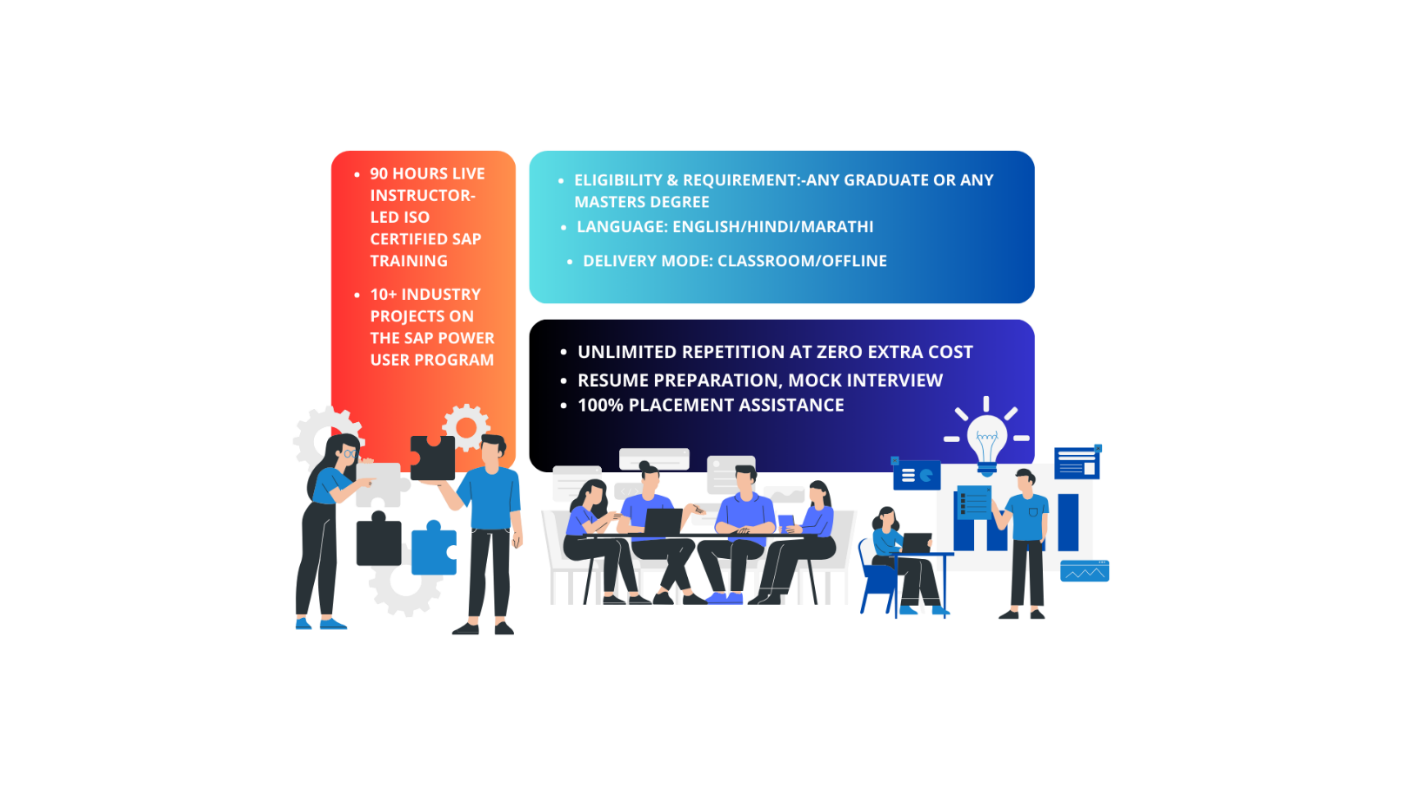- +91 8329568782
- aglearningsolutions95@gmail.com
SAP S/4 HANA MM
SAP HANA Career Opportunities – Boost Your Career Growth with SAP HANA
SAP S/4 HANA MM Training Course In Pune

SAP S/4 HANA MM Training Course In Pune

Overview of the SAP Materials Management (MM) module
SAP S/4HANA Materials Management (MM) is a comprehensive module in SAP S/4HANA that handles all procurement and inventory management activities within an organization. MM plays a vital role in ensuring a smooth supply chain process, from planning and procurement to inventory management, invoice verification, and more. The module integrates seamlessly with other SAP components like Finance (FI), Controlling (CO), Sales and Distribution (SD), and Production Planning (PP), providing a unified approach to managing materials and supply chain processes.

Key Components and Features of SAP S/4 HANA MM:
Procurement Process:
Purchase Requisition (PR): Internal document created when a requirement arises for goods or services. It forms the basis for generating purchase orders
Purchase Order (PO): Legal document issued to vendors to procure goods or services. S/4HANA MM supports different types of POs, including standard, stock transport, framework, and service POs.
Request for Quotation (RFQ) and Quotation: Enables the selection of the best supplier based on received quotes, ensuring cost-effective procurement.
Supplier Evaluation: Functionality to assess and manage vendor performance based on criteria like delivery time, quality, and price.
Master Data Management:
Material Master: Centralized data repository for all materials within the company. It contains key information such as descriptions, units of measure, procurement types, and valuation.
Vendor Master: Central record that stores all relevant details of suppliers, including contact information, payment terms, and bank details.
Service Master: Used for managing services that a business procures, with details on service descriptions, pricing, and more.
Inventory Management:
Goods Receipt (GR): Documented acknowledgment that goods have been received from the vendor and entered into stock.
Goods Issue (GI): Movement of goods out of inventory, typically for production, sales, or internal purposes.
Stock Transfer and Transfer Posting: Allows for movement of goods between storage locations, plants, or company codes.
Physical Inventory: Supports periodic inventory counting to reconcile actual inventory with system data, ensuring data accuracy.
Invoice Verification:
Ensures accurate processing of incoming vendor invoices by matching them with the corresponding POs and goods receipts (three-way matching). Any discrepancies can be flagged for resolution.
Invoice verification integrates closely with Financial Accounting (FI) to ensure proper posting of liabilities and vendor payments.

Material Valuation and Pricing:
Materials can be valuated based on Moving Average Price (MAP) or Standard Price.
Advanced valuation options, such as split valuation, allow businesses to track different valuation types (e.g., raw vs. finished goods) for the same material.
Integration with Actual Costing/Material Ledger (ML) enables more accurate cost determination and inventory valuation.
Inventory Valuation and Stock Determination:
Batch Management: Facilitates tracking and management of material batches, supporting industries where quality and traceability are essential (e.g., pharmaceuticals).
Serial Number Management: Provides granular control and traceability of individual units in stock.
Stock Determination Rules: Determine which stock to use based on availability, source, and other criteria.
Procurement Analytics:
SAP Fiori apps enable real-time analytics and dashboards for procurement and inventory management, such as spend analysis, purchase order tracking, and inventory reports.
Advanced analytics tools integrated with SAP Analytics Cloud (SAC) provide detailed insights into procurement trends, supplier performance, and cost optimization.
Inventory Optimization:
Safety Stock Planning: Helps maintain optimal stock levels by factoring in lead times, demand variability, and service levels.
Reorder Point Planning: Automatically generates procurement proposals when inventory falls below a predefined level.
External Services Management:
Supports procurement and management of external services, including service specifications, procurement contracts, and service entry sheets for tracking completion.
Subcontracting:
Facilitates scenarios where materials are provided to a subcontractor for further processing, with the ability to track components issued to the vendor and the receipt of finished goods.
Automatic Document Generation:
Automates the generation of purchase requisitions, purchase orders, goods movements, and accounting documents, reducing manual effort and improving accuracy.
Integration with Other Modules:
Finance (FI): Real-time integration ensures accurate financial postings and compliance with accounting standards.
Controlling (CO): Enables cost tracking related to procurement, cost center consumption, and budgeting.
Production Planning (PP): Supports material requirements planning (MRP) and ensures material availability for production.
Integration With Other Modules
The AP sub-module works in sync with Material Management (MM) for purchase orders and goods receipt/invoice receipt (GR/IR) processes, ensuring the entire procure-to-pay cycle is efficiently managed.
Data automatically flows to the General Ledger (FI-GL), ensuring that all payables transactions are reflected correctly in financial statements.
Advanced Features in S/4HANA:
Ariba Network Integration: Supports end-to-end digital procurement processes by connecting to the Ariba Network for supplier collaboration and e-procurement.
Central Procurement: Facilitates centralized management of procurement across multiple entities in the same system landscape, optimizing procurement processes.
MRP Live: Real-time and efficient material planning capabilities, leveraging the power of HANA for faster and more precise planning runs.

Benefits of SAP S/4HANA MM:
Real-Time Data Processing: Instant visibility into procurement and inventory data, enabling faster and more accurate decision-making.
Enhanced Supplier Collaboration: Improved collaboration and communication with suppliers lead to optimized procurement and better vendor performance management.
Cost Optimization: Tools for spend analysis, cost management, and inventory optimization reduce costs and improve operational efficiency.
User-Friendly Interface: SAP Fiori apps provide a modern, intuitive user experience for procurement professionals, making daily tasks more efficient.
Compliance and Traceability: Robust tools for tracking inventory movements, batch management, and audit trails ensure compliance with industry standards and regulations.
Integration Across Processes: Tight integration with finance, controlling, sales, and production ensures consistency and reduces errors.



